7 Best Books to Help You Find the Meaning of Life
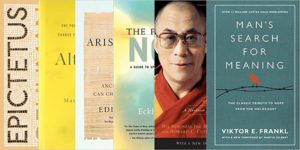 What is our purpose?
What is our purpose?
What aims should we pursue to live a fulfilling life?
There is no more important topic than the meaning of our lives. Many thinkers, past and present, have grappled with it (Baggini, 2005; & Eagleton, 2007.)
Broadly speaking, the theorists of meaning fall into two camps. Some believe that life has no intrinsic meaning and that we must construct our meanings ourselves. The meaning of life, they argue, is a subjective affair.
Others maintain that there is an absolute meaning to our existence. But they tend to disagree on what that meaning might be. The most cited contenders are happiness and love. Other common suggestions include self-realization, relationships, pleasure, service, and creativity.
The list below includes thinkers from both sides of the argument. I hope you will find it enlightening.
Before you continue, we thought you might like to download our three Meaning and Valued Living Exercises for free. These creative, science-based exercises will help you learn more about your values, motivations, and goals and will give you the tools to inspire a sense of meaning in the lives of your clients, students, or employees.
This Article Contains:
- 1. Man’s Search for Meaning – Viktor Frankl
- 2. Of Human Freedom – Epictetus
- 3. The Art of Happiness: A Handbook for Living – Dalai Lama and Howard C. Cutler
- 4. The Happiness Trap – Russ Harris
- 5. Aristotle’s Way: How Ancient Wisdom Can Change Your Life – Edith Hall
- 6. The Power of Now: A Guide to Spiritual Enlightenment – Eckhart Tolle
- 7. Altruism: The Science and Psychology of Kindness – Matthieu Ricard
- A Take-Home Message
- References
1. Man’s Search for Meaning – Viktor Frankl
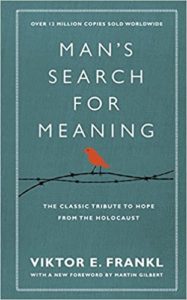 At the top of my list (and many others of its kind) is Man’s Search for Meaning: The Classic Tribute to Hope from the Holocaust (Frankl, 1946, 2004). It was written by the Austrian psychiatrist, Holocaust survivor, and founder of logotherapy, Viktor Frankl, who lived from 1905 to 1997.
At the top of my list (and many others of its kind) is Man’s Search for Meaning: The Classic Tribute to Hope from the Holocaust (Frankl, 1946, 2004). It was written by the Austrian psychiatrist, Holocaust survivor, and founder of logotherapy, Viktor Frankl, who lived from 1905 to 1997.
Frankl argues that our primary task in life is to furnish it with meaning, whatever form this may take. We must find meaning even in our suffering, he writes, for otherwise we are lost.
In the autobiographical section of his deeply moving book, Frankl relates that those who managed to stay in touch with what made their lives meaningful in the Nazi extermination camps were more likely to survive. Their personal meanings took many different forms. It could be a strong desire to return to a beloved person, complete a creative or intellectual project, or simply the strong wish to help others.
If there is a potent “why” that drives us, Frankl declares, paraphrasing Nietzsche, we can tolerate almost any “how.”
Frankl believes that we can discover the meaning of life in three main areas: “(1) by doing a deed or creating a work; (2) by encountering someone or experiencing something; and (3) by the attitude we take toward unavoidable suffering” (Frankl 2004, p. 115).
The meaning of our lives can be creativity in the broad sense of the word. This includes creative works but also merely making something, learning something, or being productive. Meaning can also be found in the experience of love and the appreciation of beauty, excellence, culture, and nature.
Crucially, Frankl (2004, p. 115) argues that meaning has to be located outside ourselves. It has to be discovered in the world rather than in our own psyches. “Being human,” he writes, “always points, and is directed, to something, or someone, other than oneself – be it a meaning to fulfill or another human being to encounter.”
Frankl’s existentialist approach, then, invites us to let go of our obsession with ourselves and of values such as self-realization, self-improvement, and happiness. Instead, he urges us to focus on meanings that lie outside the boundaries of our own psyches.
Find the book on Amazon.
2. Of Human Freedom – Epictetus
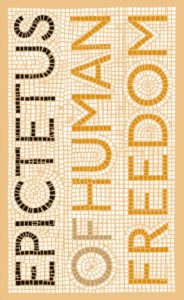 Like the other philosophers of the Stoa, the former Greek slave Epictetus (c. 55–135 C.E.) strongly believed that we can control our feelings by controlling our thoughts.
Like the other philosophers of the Stoa, the former Greek slave Epictetus (c. 55–135 C.E.) strongly believed that we can control our feelings by controlling our thoughts.
All suffering, he holds, is in our minds. It is not caused by external events but by our reactions to those events – by our faulty judgments and unrealistic expectations.
Because most external events are beyond our control, Epictetus believed that it is pointless to worry about them. But our evaluations of these events, by contrast, are entirely within our control. It follows that we should not attach significance to any external phenomena or circumstance. Instead, all our mental energies should be directed inward, with a view to controlling our minds.
Epictetus believed that we should rationally evaluate our cognitions at all times and simply reason ourselves out of upsetting emotional states. He suggested installing a rational fact-checker in our heads, whose task it is to keep our mental state balanced and calm. If this sounds familiar, that’s because Stoic thought is the ancient precursor of Cognitive-Behavioral Therapy (CBT).
Epictetus’s essay Of Human Freedom is a beautiful and concise introduction to Stoic wisdom. He writes about “Concerning what is in our power and what is not,” “How a person can preserve their proper character in any situation,” “On satisfaction,” and “How we should struggle with circumstance.” He reminds us that “Every circumstance represents an opportunity.”
The more we value things beyond our control, the less control we have. Freedom is, therefore, “not achieved by satisfying desire but by eliminating it” (Epictetus, 2010, p. 81). Life is suffering; bad things will happen, Epictetus asserts.
When they do, we can use our bad luck to test our resolve and strengthen our resilience. “So when trouble comes, think of yourself as a wrestler whom God, like a trainer, has paired with a tough young buck. For what purpose? To turn you into Olympic-class material” (Epictetus, 2010, p. 14).
The Stoics’ ultimate aim is control. They want to be the masters in their own house so that they become completely invincible to the many blows that fortune has in store for us. Essentially, they pursue a radical kind of inner freedom that grants full autonomy from external events. Honing a Stoic mindset, they believe, is our most noble purpose in life. The prize is inner peace.
Find the book on Amazon.
3. The Art of Happiness: A Handbook for Living – Dalai Lama and Howard C. Cutler
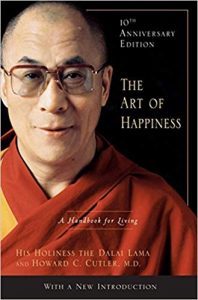 Tenzin Gyatso, the 14th Tibetan Dalai Lama, has cowritten a bestselling self-help book entitled The Art of Happiness: A Handbook for Living with the psychiatrist Howard C. Cutler (2009).
Tenzin Gyatso, the 14th Tibetan Dalai Lama, has cowritten a bestselling self-help book entitled The Art of Happiness: A Handbook for Living with the psychiatrist Howard C. Cutler (2009).
In this book, he presents Buddhist thought as a comprehensive framework for ethical self-improvement.
Through effort and practice, and by adopting basic Buddhist assumptions about the world, the Dalai Lama believes we can cultivate happiness, wellbeing, and compassion.
Cutler supplements the Dalai Lama’s ancient wisdom with anecdotes from his psychiatric practice, as well as with neuroscientific arguments about brain plasticity. This combination of modern science and ancient thought is powerful.
Buddhism, Cutler and the Dalai Lama argue, offers an effective psychological, philosophical, and spiritual framework for transforming the self, above all through practicing compassion. In fact, the Dalai Lama declares kindness the very essence of his religion.
However, Buddhist happiness also entails a critical cognitive dimension. To achieve true happiness, we have to embrace the insight that our notion of a permanent and separate self is an illusion and that this very notion is the cause for much of our suffering.
Find the book on Amazon.
Penguin lecture 2011 – the art of happiness – Dalai Lama
4. The Happiness Trap – Russ Harris
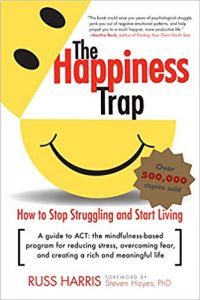 The Australian psychologist Russ Harris (2008) challenges the idea that the meaning of life is to chase happiness. He believes that the current Western conceptions of happiness are entirely counterproductive.
The Australian psychologist Russ Harris (2008) challenges the idea that the meaning of life is to chase happiness. He believes that the current Western conceptions of happiness are entirely counterproductive.
His international bestseller, The Happiness Trap, is based on the principles of Acceptance and Commitment Therapy (ACT). Unlike the Stoics and CBT, ACT does not encourage us rationally to challenge our negative thoughts and feelings. Instead, it asks us simply to recognize and accept them, and then to let them go.
Together with present-moment awareness, value-based living, and taking committed action, ACT suggests acceptance as the healthy alternative to counterproductive attempts to control our unproductive thoughts.
Our default mode is not happy, Harris argues. We should simply accept this fact rather than wasting all our energy on fighting it.
Evolution has shaped our brains in such a way that we are now hardwired to suffer psychologically. For millennia, our minds have been trained to predict, detect, and avoid danger. The better we were at that task, the more likely we were to survive.
As a result, our minds are now constantly on alert, assessing and judging everything we encounter. But what used to be a crucial survival skill in the age of the saber-toothed tiger has turned into a curse in the social media age.
Now, we simply cannot stop comparing, evaluating, and criticizing ourselves, focusing on what we lack, growing dissatisfied with what we possess, and imagining “all sorts of frightening scenarios, most of which will never happen” (Harris, 2008, p. 5). What makes matters even worse is that our naturally edgy and slightly anxious state of mind has been pathologized in our feel-good society.
We are not just naturally unhappy, but also constantly made to feel guilty about it, which makes matters worse. Harris (2008) argues that we have far less control over our thoughts and feelings than we like to think. The idea that we can cure ourselves by controlling our unwanted thoughts is simply an illusion.
Willpower is a limited resource, and it is much better to manage our condition than to expend all our energy on trying to avoid or change bad thoughts. Instead, we should simply observe and accept them and then try to let them go. We can then invest our energies in what truly matters: leading a value-based life and taking committed action.
Find the book on Amazon.
5. Aristotle’s Way: How Ancient Wisdom Can Change Your Life – Edith Hall
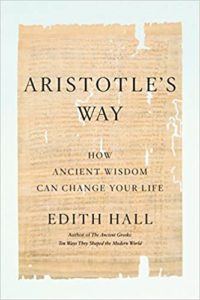 The Greek philosopher Aristotle (384–322 BCE) believed that happiness is the ultimate goal of human life and our highest good. Moreover, it requires the fulfillment of our potential and the actualization of our highest human capacity.
The Greek philosopher Aristotle (384–322 BCE) believed that happiness is the ultimate goal of human life and our highest good. Moreover, it requires the fulfillment of our potential and the actualization of our highest human capacity.
Our primary function as human beings, Aristotle believed, is rational activity in accordance with virtue. Aristotelian happiness, then, is inextricably linked to repeated virtuous action.
To realize our potential, we have to work on our behavior and emotional responses to become the best versions of ourselves. Aristotle strongly believed that we can train ourselves to be good by strengthening our virtues and controlling our vices.
A happy state of mind, he wrote in the Nicomachean Ethics, comes “from habitually doing the right thing” (Hall, 2018, p. 7). Aristotle, then, already knew about the vital power of habit. Rather than teaching and intellectual understanding, he considered habituation as the primary route to moral virtue.
In Aristotle’s Way: How Ancient Wisdom Can Change Your Life (2018), the classical scholar Edith Hall presents a charming and robust case for the relevance of Aristotle’s virtue ethics as a timeless self-help framework. It can also function as a powerful guide to the meaning of life.
Hall highlights that Aristotle’s idea of the good life (eudaimonia) emphasizes our moral responsibility for our actions. We have to actively “do” eudaimonia, because “for Aristotle, happiness is activity” (Hall, 2018, p. 26).
Find the book on Amazon.
6. The Power of Now: A Guide to Spiritual Enlightenment – Eckhart Tolle
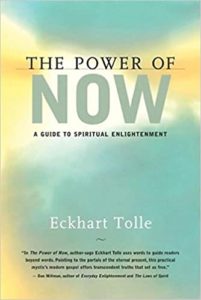 In his bestselling self-help book The Power of Now: A Guide to Spiritual Enlightenment, the German-born writer Eckhart Tolle (1999) argues that the meaning of life is simply being present.
In his bestselling self-help book The Power of Now: A Guide to Spiritual Enlightenment, the German-born writer Eckhart Tolle (1999) argues that the meaning of life is simply being present.
But truly being present is far from a simple matter. The key to living in the present, Tolle writes, is to stop identifying with our minds and the stream of involuntary and incessant thinking we tend to take as our personal essence.
Instead, we have to practice adopting the position of a disinterested observer, watching our minds chatter away, but without taking the chatter too seriously.
Our true essence, then, is not to be found in our shifting emotions or compulsive thinking, but in what lies behind it. Like the Buddhists, Tolle believes that our very notion of self is an illusion, a fiction of the mind that we need to let go. We need to learn to witness our thought patterns rather than identify with them.
Most of our thoughts and emotions revolve around the past or our future. Our past furnishes us with an identity and narratives of cause and effect. Our future, in turn, “holds the promise of salvation, of fulfillment in whatever form” (Tolle, 1999, p. 40). But both are illusions.
We need to practice withdrawing our attention from the past and the future and instead be present as “watchers” of our minds. Watching is all we need to do, and it includes refraining from analyzing and judging.
Tolle (1999) writes that the present moment is all we ever have. The now is not only the most precious thing there is, but it is also the only thing there is. “Give attention to the present,” he urges, “give attention to your behavior, to your reactions, moods, thoughts, emotions, fears, and desires as they occur in the present” (Tolle, 1999, p. 75). Tolle sees this exclusive focus on the present as the royal road to our salvation.
As he puts it:
True salvation is a state of freedom – from fear, from suffering, from a perceived state of lack and insufficiency and therefore from all wanting, needing, grasping, and clinging. It is freedom from compulsive thinking, from negativity, and above all from past and future as a psychological need (Tolle, 1999, p. 122).
There is nothing we can ever do or attain, Tolle writes, that will get us closer to salvation than this moment. By freeing ourselves from our enslavement to our minds, we can radically transform our consciousness. And this radical transformation of consciousness is precisely what is needed to save not only ourselves but also humanity at large and our planet.
Find the book on Amazon.
7. Altruism: The Science and Psychology of Kindness – Matthieu Ricard
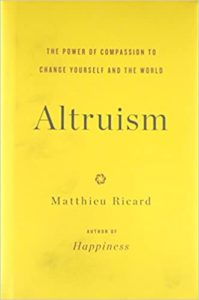 The French-born Buddhist monk Matthieu Ricard is both a theorist and a practitioner of altruism.
The French-born Buddhist monk Matthieu Ricard is both a theorist and a practitioner of altruism.
He believes that the meaning of our lives is to practice altruism.
Altruism is the desire to ensure the good of others and to care for them in a benevolent way. Its Christian form (agape) is unconditional love for everyone – for ourselves, our neighbors, and our enemies. But Buddhists go even further, wishing for the happiness of all sentient beings.
In Altruism: The Science and Psychology of Kindness, Ricard (2015) argues that the wider our circle of care is extended and the more unconditional and inclusive it becomes, the more genuine our altruism is.
We all have a biological tendency to care for the wellbeing of our children, our relatives, and the people who are kind to us. But we must cultivate the art of extending our altruism much further. “The quality and validity of an ethic increases with its degree of universality,” Ricard writes (2015, p. 154).
In most religions, altruism is the highest moral and spiritual value. Ricard presents altruism as the solution to all our problems – social, economic, and environmental. Altruism, he writes, “is the Ariadne’s thread allowing us to connect harmoniously the challenges of the economy in the short term, quality of life in the mean term, and our future environment in the long term” (Ricard, 2015, p. 691).
Buddhist altruism has two faces: loving-kindness and compassion. Buddhists desire not only that all beings find happiness, but also that they understand the causes of that happiness as well as those causes of suffering. There is, then, an important insight-oriented dimension to Buddhist altruism. In other words, it is not just a matter of the heart, but also a matter of our rational brains.
Furthermore, as numerous psychologists have shown, engaging in altruistic acts not only makes others happier; it also makes the one performing the act happier. It is, then, an ancient win–win behavior.
Find the book on Amazon.
A Take-Home Message
You will no doubt have noticed that some of the ideas on what constitutes the meaning of life explored above are in contradiction. Some, such as Epictetus and Tolle, argue that we can find meaning inside our selves, by shoring up our defenses against the blows of fortune and by being present.
Frankl, Aristotle, Harris, and Ricard, by contrast, argue that meaning has to be located outside our own psyches. We need to do valuable deeds, they maintain, and engage in meaningful and virtuous interactions with others. The Dalai Lama and Ricard propose that our purpose in life is practicing kindness and altruism. Aristotle and Epictetus favor virtuous self-cultivation. All of them present persuasive cases.
The lesson from all of this is both banal and profound. Meaning is subjective. It cannot be imposed. It has to be discovered or created. There is no one-size-fits-all meaning we can simply adopt.
Some prescriptions and suggestions may resonate with us; others won’t. But I fully agree with Frankl that there is no more pressing task than to start the work of identifying what makes life meaningful for us. And when we know what is most meaningful to us, we must ensure that our lives are dedicated to serving these meanings and that we create the best possible conditions for realizing them.
We hope you enjoyed reading this article. Don’t forget to download our three Meaning and Valued Living Exercises for free.
- Baggini, J. (2005). What’s it all about? Philosophy and the meaning of life. Oxford University Press.
- Dalai Lama & Cutler, H. C. (2009). The art of happiness: A handbook for living. Hodder & Stoughton.
- Eagleton, T. (2007). The meaning of life: A very short introduction. Oxford University Press.
- Epictetus & Dobbin, R. (Trans.) (2010). Of human freedom. Penguin.
- Frankl, V. E. (1946, 2004). Man’s search for meaning: The classic tribute to hope from the Holocaust. Rider.
- Hall, E. (2018). Aristotle’s way: How ancient wisdom can transform your life. Bodley Head.
- Harris, R. (2008). The happiness trap. Based on ACT: A revolutionary mindfulness-based programme for overcoming stress, anxiety, and depression. Robinson.
- Ricard, M. (2015). Altruism: The power of compassion to change yourself and the world. Little, Brown and Company.
- Tolle, E. (1999). The power of now: A guide to spiritual enlightenment. Hodder & Stoughton.
Let us know your thoughts
Read other articles by their category
- Body & Brain (49)
- Coaching & Application (57)
- Compassion (26)
- Counseling (51)
- Emotional Intelligence (24)
- Gratitude (18)
- Grief & Bereavement (21)
- Happiness & SWB (40)
- Meaning & Values (26)
- Meditation (20)
- Mindfulness (45)
- Motivation & Goals (45)
- Optimism & Mindset (34)
- Positive CBT (29)
- Positive Communication (20)
- Positive Education (47)
- Positive Emotions (32)
- Positive Leadership (18)
- Positive Parenting (4)
- Positive Psychology (33)
- Positive Workplace (37)
- Productivity (17)
- Relationships (46)
- Resilience & Coping (36)
- Self Awareness (21)
- Self Esteem (38)
- Strengths & Virtues (32)
- Stress & Burnout Prevention (34)
- Theory & Books (46)
- Therapy Exercises (37)
- Types of Therapy (64)

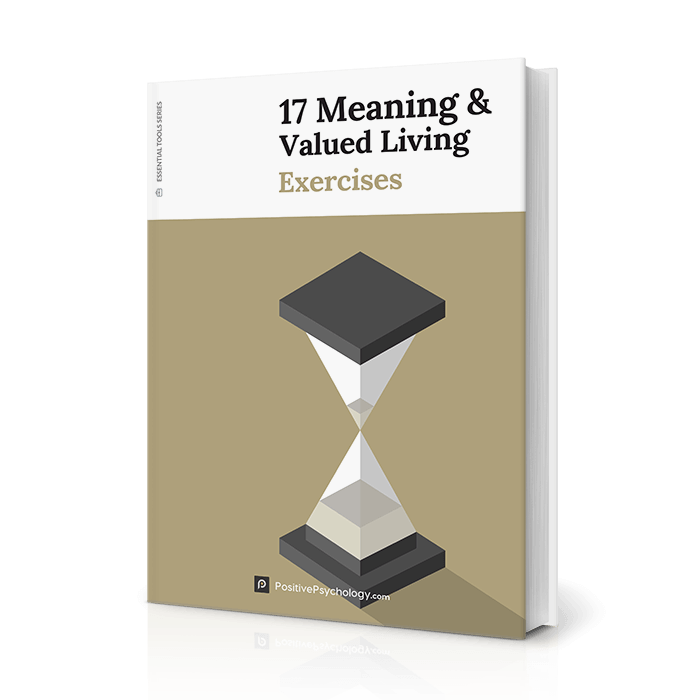
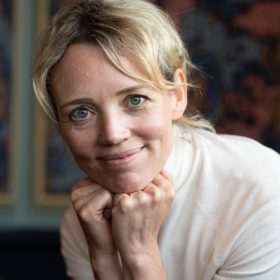



What our readers think
Wonderfully helpful. Thank you for these tips 🙏 ❤
There is nothing more transformative then
a relationship with Jesus. Why leave Him out
A discussion without His input is lifeless. I respect the other authors you included but my Soul was not engaged.
Thanks for this great list, but why no books from a Christian perspective? Christianity has been the most influential meaning making system of Western culture. John of the Cross, Teresa of Avila and the writings of the Philokalia challenge and encourage us to make meaning in our lives. Oh, the Gospels too.
Thank you for the list. My son is in a battle with depression, desperately searching for meaning or a higher purpose.
Thank you so much for this list and summary of the various philosophies on meaning. I have some new books now to read
Great books. Would like to keep a set for my office and library so that more people could share the brilliance of the authors.
How about adding Islam it gives us a meaning of life we are not here only for happiness WE are here for test
Nice list of great books. I have read most of them.
You can include the Holy Bible to the list. Many people including myself found the meaning of life through that great book.
How about adding the Bible to your list of books to find meaning to life?
Ahahahahaahaha hahahahaaha joke of the year 😀 Hahaha that was super funny! 😀
You won’t be laughing hysterically when you stand before Him, The King of Kings and Lord of Lords.